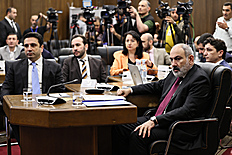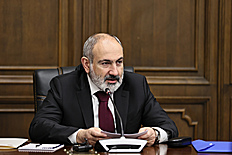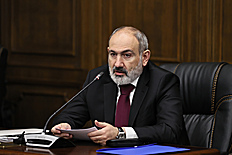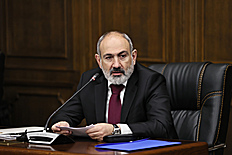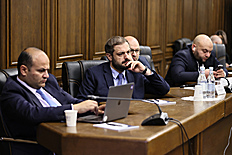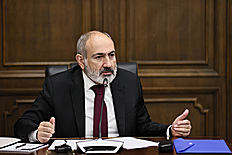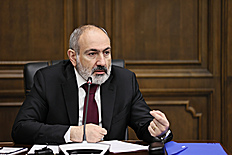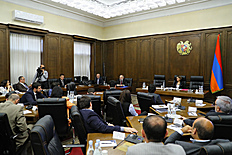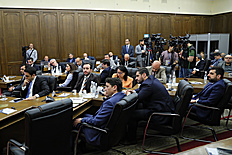Statements and messages of the Prime Minister of RA
Prime Minister Nikol Pashinyan's speech at the discussion of the state budget 2023 execution report at the National Assembly standing committees
more 6 photos
Honorable President of the National Assembly,
Dear Deputy Presidents,
Chairmen of the committees,
Dear Members of Parliament,
Dear Cabinet members,
First of all, I want to once again congratulate all of us on the occasion of the Republic Day, which is celebrated on May 28. I don't recall ever having such a coincidence before, but since we're discussing the budget execution report the very next day, I'd like to talk a little less about the numbers and a little more about the concepts, because by and large the state budget is essentially about the organization of the life of our state, about the financial costs of the organization of the life of our state and the taxes and payments formed as a result of our joint work.
And it is very important that we address that issue. By the way, that issue was still on the agenda when I participated in budget discussions as an MP, because by and large, the issue related to the budget is as follows: in any given year, we have certain revenues and in any given year we have certain expenditures, but it is very important to give a concrete answer to a question: what problem do we ultimately solve with these expenditure, what is the concept behind our actions and activities and why do we do it? The answer to this question, by the way, concerns both departmental directions and the government, the state in general. I have said several times in the past and now I want to reaffirm that, perhaps, the state is the most expensive human initiative, there is no other human initiative that is more expensive than the state. It is also very important to answer the following question, and its answer is important for both the government and the citizens, because this expensive payment is ultimately made by the citizens from the taxes they generate. Why should the citizen pay for that expensive project? This is an extremely important conceptual question, and moreover, it is to these conceptual questions that we have been constantly referring to in recent years in parliamentary and not only parliamentary formats: Finally, what’s the purpose of that expenditure?
And returning to the leitmotif of the Republic Day, I want to emphasize that the concept of the Republic is precisely that citizens create a state for themselves, they pay a rather high price for the existence of that state, but it is very important to understand what that state is for. In my speech yesterday in Sardarapat, I touched a little on the issue that, in the end, is the state meant to implement the ideas put forward by the isolated groups that consider themselves or considered themselves elite. In other words, should citizens devote their work to the ideas put forward by isolated elites, such as historical justice, or to the issue of ensuring their own well-being? This is a very important conceptual question, because when we say that the most expensive initiative is the state and the citizen pays for that initiative, we need to understand what we use that tool for or what it should serve. And I want to note that this conceptual clarification should necessarily be done, we must perceive the state as a tool aimed at ensuring a good life. And this is why the state is expensive, because living well is expensive. In other words, the state as an initiative is expensive because living well is expensive. And what is the aspiration of a person, what should be the aspiration and goal of a citizen of the Republic of Armenia? The aspiration and goal of the citizen of the Republic of Armenia should be to live well, and the citizen creates and maintains the state so that this collective organization ensures the good life of the ordinary citizen. And this is a very important point, and it's a point that maybe hasn't been made in conceptial sense for a very long time. And this is the development of the concept of Real Armenia, which I spoke about during the report on the progress and results of the Government’s Action Plan 2021-2026.
And yesterday, in my speech in Sardarapat, I said that in my opinion, a person, a citizen wants to live and not suffer, a person wants to enjoy life and not beg, a person wants to love and be loved, a person wants to be free, prosperous, cheerful and happy, people want to live in a peaceful, fair and dignified environment. And this is the goal that the state, the Republic of Armenia, should serve for, which is the state of a person and should serve a person. And therefore, when we answer the question that during the year, we have this much budget income and this much budget expenditure, why are we doing it, what is our goal? I think we should state that our goal is this and should be this. Of course, if we now record that this is and this must be, at least this means that we are not sure that our perception at the level of our socio-psychology was such. And I consider it necessary that we, the parliament, the ruling majority, talk about this more and more and more and more confidently and also say and also edit and also proofread a number of concepts that we use quite often and ensure the development of these concepts.
Returning again to the leitmotif of the Republic Day, in my message on the Republic Day, I also noted that in my opinion, we should note that freedom is no longer enough for the citizen of the Republic of Armenia because justice is needed, security is no longer enough because peace is needed. We did not even notice that during the existence of our state, what we called security was quite dangerous. This is a very important point. We named it security, but we tried to ensure that security by generating new threats. And therefore, it must be stated that security is no longer enough, because peace is needed. It is peace that can provide security. The concept of security that we have implemented so far does not provide security itself, it creates threats. And this is also the gap between the concepts of Real Armenia and non-real Armenia.
Neither well-being is not enough, because what does well-being itself mean? These are also very important questions, but if we look at a very embryonic level, well-being is when a person has clothes, food, an armchair, a chair and has the ability to meet and satisfy certain material needs. And should that be enough for us? I think no, we should not be satisfied, because with all those conditions, a person can be unhappy. And therefore, well-being is not enough anymore, because happiness is needed. And I also want us to review our attitude towards viability as well, because we keep saying that we must be viable as a state, we must be viable as people, and this comes from the logic of survival, that viability is, however, so to speak, the institutional level of survival. And I consider it necessary to emphasize that I think we should record that viability is no longer enough, we need cheerfulness or vitality. I don't remember that these concepts are often discussed in this hall and in general, from state podiums. And this is a fundamental problem, because yes, we have to record that the state, the people, should know why they financed an expensive initiative, if they finance it, so that as a result they live worse, feel less free and less happy, that state will lose its meaning for a person.
And I want to draw our attention again to the fact that after gaining independence, our most visible trend has been, continued and continues to be the trend of emigration. What is emigration? Emigration is the following: a person is looking for a suitable place to live. Has the citizen of the Republic of Armenia created a state so as to find another suitable place to live? Does that mean that the Republic of Armenia is not such a good place for him to live, and why does he work, why does he pay taxes to this state and why is it like this? Because the Republic of Armenia was ruled and the power in the Republic of Armenia was formed by elites or by circles that consider themselves elite, whose ideology has essentially been clerical-feudal, and that ideology, in fact, has not undergone significant development in recent centuries. That ideology has been instilled into people, all of us, through the education system, and as a result, we've got this crack. Imagine a person creating an independent state, and then looking for a place to live, this is the same as us taking a mortgage loan, buying a house and going to rent another house.
This is the short definition of our reality. Why? For a simple reason, because, excuse me, let me give everyday examples, for example, when that citizen sits on the balcony in short pants in the morning, drinks coffee, the people standing next to him say: what are you doing, it is not allowed, you are insulting our ideas, you're not here to drink coffee, there are lofty ideas, shame on you, put on shorts in the conditions of those lofty ideas, you are sitting on the balcony drinking coffee, instead of throwing yourself off the balcony, in order to draw the attention of the international community to something very concrete and on an important issue. If one wears colored clothes, they say, "Shame on you. How can you wear colored clothes in the conditions of mourning and tragedy, and who will mourn if you wear colored clothes, scum, traitor?" Someone celebrates birthday, they say: instead of going to a funeral, you celebrate birhday? One, two, three, four, the person says: OK, this house is for you, and my coffee cup is a gift for you, you can pay nothing, I'll go find a place to live, where I can drink coffee on the balcony and no one will cry shame on me for that.
And I want us to assess to assess what has happened to us as the ruling majority in recent years, after the revolution? And perhaps our biggest shame or biggest problem is when in 2018 we took over the administration of the Republic of Armenia, we continued the clerical-feudal traditions. And this is happening to us today, why do I consider my May 24 message important? To try to explain to the citizens of the Republic of Armenia what is happening today in the Republic of Armenia, but I think this conversation is not a one-day conversation. What happened to us? Today they tell us: you used to say something like this in 2018, 2019, now you don't seem to say that, why, because we ourselves are overcoming clerical-feudal thinking and the clerical-feudal system is revolting, saying: what right do you have to think, we have created the patterns of thinking for centuries and you have to think within that pattern. If you think outside of that pattern, then you're a traitor, and so on and so forth. But when we return to the concept of living well and understand that the state cannot be anything other than an instrument for ensuring the justice, happiness, cheerfulness of its own citizens, an instrument for ensuring good living, we must return to this question: what is needed for this at the political level? For that, an efficient state is needed, and what do we mean by an efficient state? Moreover, it is also very important that the answer to this question may have been written in the textbooks, but the answer to this question, if not with every year's budget, with every medium-term expenditure plan should be formulated: what is an efficient state because what is written in the textbook may not work today, it is a good base just to know.
In my estimation, today we should record that an efficient state is a state capable of making decisions adapted to the challenges and goals of the constantly changing and developing world. And this is the only formula that will ensure the permanence of the state and the viability of the state. This is exactly what is happening. This is what happens to us: we say well, we read it in the textbook, told it and got a good mark for it, but if we respond to today's realities in the cliché of what we read in the textbook, told and got a good mark, we will lose the state. And I am very happy, you remember that in 2022-2023 I stated several times from the parliamentary podium that if we can ensure the existence of our state for one or two years, we will ensure the existence of our state in the long term.
In terms of the report on 2023 budget execution, this is the most important record, considering that the budget is not a financial, accounting document, but provides content. Now, what have we achieved as a result of spending the 2023 state budget? As a result of the spending of the 2023 state budget, we have achieved the following, that we have overcome the phase of those challenges, threats, because if in 2020, 2021, 2022, 2023 we saw a direct and immediate threat to the existence of our state, today we can record that we were able to manage and neutralize the direct threats to our state, the direct threats threatening the existence of our state, in the short-term sense and in the medium-term sense, by implementing the above formulas. But we must also understand that in the long term it is very important to continue this policy and, based on the Real Armenia strategy, make decisions that fit into this logic.
We must be a government, parliament and ruling majority capable of constantly changing and developing in a changing world, making decisions adapted to challenges and goals. This is the goal and the achievement that we have with the results of spending the state budget of 2023. And we must continue to pursue this goal.
I want to emphasize one more thing: within the framework of the strategy of Real Armenia, under the conditions when the state is exclusively a tool to ensure the good life of citizens, not only should Real Armenia become a state ideology and strategy, but also work should become a state ideology and strategy, because I already said , that living well is a precious phenomenon, a tool to ensure a good life, having a state is a precious phenomenon. And to service those expensive luxury living expenses, it is necessary to generate more and more funds every year. The tool to generate more and more funds every year is work. And work should become a popular and state ideology in the Republic of Armenia. A person who does not work should not be respected. Although I assume and I am convinced that it is so, but we also need to understand that unemployment and the resulting problems have deep institutional reasons, including socio-psychological, but also institutional reasons. And in this regard, I think our biggest challenge is to be consistent in education reform. Of course, it should always be understood that the political assessment has a large part and it does not try to be mathematically exact, but at a recent Cabinet meeting I had the opportunity to give the following assessment: what do we teach with our education system and I answered that with our education system we teach to suffer, we teach how not to sit on the balcony in shorts and drink coffee when there are so many problems. Meanwhile, with our educational system, we have to teach to live and to live well. And we must teach that there is only one way to live well, it is professionalism, it is hard work, it is the skill of developing one's ability and talent, it is the skill of getting rich and enriching others.
This debate also takes place around the educational system, when the Government of the Republic of Armenia tries the educational clerical-feudal logic, the purpose of which is to make suffering the only way to live, and for the people, for the ordinary people, the elites with their Range Rovers and Brabuses do not suffer at all, even during wars they do not suffer, they do not suffer during peace, they do not suffer during an epidemic, they do not suffer during a crisis. We have to eradicate this logic. And we are trying to eradicate that logic, and that is why there is resistance again. It’s we who decide what to learn and how to learn. No, what should be learned and how should be learned is decided by the people through their elected bodies with the logic that their elected bodies should teach their children to live well, the skill of living well. The school should only give one thing: the skill of living well, with the logic that identity and values are the most important conditions for living well. And this is also the reason why in 2019, perhaps for the first time in our reality, an attempt was made to formulate what our national values are, because in the reality of our politics, reference is made to national values for any reason. Well, we need to understand what our national values are.
After the 2019 National Security Strategy, I found it important that we really formulate and re-formulate what the national values of the people of the Republic of Armenia are, because these national values are part of our identity, and maintaining and developing that identity is part of happiness and well-being. A person cannot be happy without his identity. I think it's important to take this opportunity once again to voice the perception that I have, absolutely not claiming that this is a complete list or excluding that we still need to work on this concept.
And so, the national values of the people of the Republic of Armenia are Armenian statehood, the Republic of Armenia, I think that this is the number one national value of the people of the Republic of Armenia. Independence, sovereignty, citizenship, democracy, army of the Republic of Armenia. Moreover, here I want to make a comment about the change in our perception of the army. The Republic of Armenia needs the army not for war, but as an instrument of peace, like all other state institutions. Continuing the list: the history of Armenia, the folklore of the Armenian people, particularly the epic, beliefs, legends, myths, the Armenian language and writings, Armenian literature, including translated literature, knowledge and science, the Pan-Armenian potential, the Armenian diaspora. Why is this a value? Because the people who bought the house and went to rent another house somewhere else, those people are part of our identity and our society, and here too we need to formulate our strategies precisely. Continuing the list: Homeland, family, individual. If the individual is, for example, a national value, this is also a very important thing that we should be able to value the individual, which is not so emphasized in our reality, which is expressed by the attitude towards the color of the clothes I talked earlier, because society should not decide what color clothes an individual should wear? The individual himself should decide which color expresses his identity, personality, and he should go out wearing clothes of that color. The Armenian Apostolic Holy Church, Armenian Catholic Church, Armenian Evangelical Church, Christianity.
Moreover, there is a lot of talk about it and an attempt is made to accuse us of not having a proper attitude towards some values. I believe that this does not express the reality at all, because if the people inside some institutions with their actions discredit and nullify the institutions that are of national value for the people of Armenia, I will not say that it is not the government's business, it is the government's business, and we should deal with it, but it's not the government's fault. I am sure of this. Continuing the list of values: Armenian Ashugh, Gusan, folk, classical, original and pop music, Armenian dance, Armenian fine arts, Armenian performing arts, Armenian architecture, Native nature with its biodiversity, Progress, liberalism, self-love, hospitality, love for education, hard work, law-obedience, respect and tolerance towards other people, peoples, religions, Fraternal feelings and relations towards national minorities and inseparable identity with them, expressed by the citizenship of the Republic of Armenia, Armenian cuisine, all those samples of tangible and intangible heritage that express, depict, describe and symbolize the national values of the people of the Republic of Armenia described above. What does this have to do with the 2023 budget execution report? The connection is direct, that this is the goal, that by spending the budget we must ensure the preservation and development of these values. And this is the next global goal that we should set before ourselves. I don't want to talk about the methods of that work now. I have had occasion to talk about it and I am sure I will have it again.
And so that today's discussion does not lack numbers, I would also like to present some data related to the 2023 state budget and in a wider context. It is very important to note that in 2023 we had an economic growth of 8.7 percent, which is higher than our goal expressed in the pre-election program for the 2021 snap elections. And I want to record that in both 2022 and 2023 we had economic growth above that goal. And our goal was to have an average annual economic growth of 7 percent. But it is also important to note that since the People's, non-violent, velvet revolution of 2018, the economy of Armenia has grown by almost 30 percent. This is a very important indicator. Compared to 2017, the GDP per capita of the population increased by about 37 percent in real terms and more than doubled in dollar terms after the revolution. I talked about jobs on a conceptual level, I consider the statistics we have in terms of newly created jobs to be very important. In January 2024, we had 713,715 jobs, an increase of 200,656 compared to January 2018. And to avoid presenting one-month data, I have combined the indicators. This was January 2024. In December 2023, we had 741,726 jobs, which is by 206,208 more than in December 2017. In April 2024 compared to April 2018, this is already the most recent data, there were by 205,991 more jobs than before the revolution. In other words, by combining these three data, we can clearly and unequivocally say that more than 200,000 new jobs have been created in Armenia since the revolution.
The next data is that since 2018, unemployment in the Republic of Armenia has actually decreased by 5 percent, if we look simply at numbers. But we also have a problem with changing the methodology here, and that's why I think that this comparison is not very correct, but nevertheless, with the new data, with the new methodology, unemployment in the Republic of Armenia in 2023 has decreased and was 12 percent, and we must continue in this direction.
Revenues from taxes and duties in 2023 were by 297 billion 600 million AMD more than in 2022, or 14.5 percent. But it is also important that the tax revenues of the budget are more than in 2017 by 1 trillion 63 billion AMD or 92 percent. In other words, our budget revenues have increased by 92 percent in 2023 compared to 2017.
68 billion 200 million AMD were returned to citizens for income tax in 2023, which is by 63 billion AMD or 14.5 percent more than in 2018. Since we talked about buying an apartment with a mortgage loan, since 2017, 36,686 citizens have bought an apartment in the Republic of Armenia with this mortgage program. After the revolution of 2018, 36,686 citizens acquired a new apartment in the Republic of Armenia with this income tax refund program, let's say cases instead of citizens, it is more correct because there may be citizens who purchased 2 apartments. The growth compared to 2017 is 1,648 percent. This is the case when I say that when paying taxes to the state budget, a citizen should not act as if he is giving money to someone else, but as if he is putting money from one pocket to another. This is the most direct expression of that case, because part of the income tax is returned to the citizen. And with the other part of the income tax, a road to that new building is built, infrastructure is built, a school is built nearby for his child, a kindergarten is built nearby for his child. The quality is another issue, which, yes, we know we have some problems with. But the way to solve the quality problem is that construction with quality happens and the culture is formed when there is construction in the country. In other words, why did we have this gap in quality? Because in fact, we have not had significant capital construction for a decade. And one of the proofs of this is the following: the capital expenditures of the 2023 state budget amounted to 494 billion AMD, which is 3.3 times more than in 2018. Of course, there are also defense costs here, but roughly, there were defense costs at that time as well.
In other words, in essence, capital expenditures have tripled, and it is in this process that we should be able to really establish quality construction standards. Yes, I repeat, this is also a problem. If we open the textbook, we are a nation of builders, aren't we? We are building, we are doing this, we are doing that, the child comes out of the classroom, sees the school collapsing on his head, says: wait a minute, why is this happening? It also shapes attitudes towards education. Doesn't the child know and feel where he is being lied to? Even if he doesn't feel it today, he will feel it tomorrow, if he doesn't feel it tomorrow, he will feel it the next day. And this forms an attitude towards the state. He begins to evaluate himself as a citizen from this perspective, and the state as the result of his activities. But here, too, my point is that we should just work consistently.
In 2023, we returned 288 billion AMD to the business in terms of added value, which is by 197 billion AMD or 3.2 times more than in 2018. But I must say that we also see that this leaves room for abuse in large numbers. In general, we should also not step back from our positive policies if they are widely abused. I, for example, want to go back to that debate, there was statement regarding universities, that there should be no political representations at all, yes, we showed that goodwill, but then we saw that universities turned into a favorable environment for underground networks of extremist groups. Even now, there are still many deep problems in that regard. No, we have to exercise political leadership. And I want to say that the government will not give up political leadership in any field. And this within the framework of the logic I talked about, with the aim of properly recording the ever-changing challenges in the ever-changing world.
Returning to numbers, the average monthly nominal salary in 2023 increased by 14.6 percent compared to the previous year, and the real salary by 12.4 percent. The real salary, if we include inflation, this is how much more does a person earn given the inflation, and last year that number was 12.4 percent. This is about the working man, because when we say that a man has earned so much more, this becomes a matter of much discussion, but it is about a working man, a non-working man has not earned anything more because he has not worked, which is a very simple logic.
And it is very important to note that the real salary increased by 34 percent in 2023 compared to 2018. We have even had inflationary shocks, but above all price increases, our real salaries increased by 30 percent since 2018.
One more data, in 2023, more than 5 billion AMD were returned to pensioners and beneficiaries from non-cash trade, and the total volume of non-cash transactions carried out by pensioners was 60 billion 104 million AMD. This is a very good program, an important program that helps us reduce the shadow. But there are also certain concerns here. Recently, I asked for information on what, after all, our dear pensioners spend this money on, and I was surprised to note that the money is spent by a large margin on cigarettes in the first line, and gasoline in the second line. This should at least give us some reason to wonder what is causing this. I think that in the case of cashless trade, we should develop the refund program, there are discussions in the government on how and when to do it, but on the other hand, we should also make some substantive changes so that it does not turn out that we push our beloved pensioners or their grandchildren to we smoke more. Our goal is that they not only smoke less, but also not smoke at all and live a healthy lifestyle.
Dear colleagues, there is actually a lot to say, but I am sure that the Cabinet members will present no less important details and answer your questions, especially regarding the substantive and numerical part of the budget.
Thank you.
